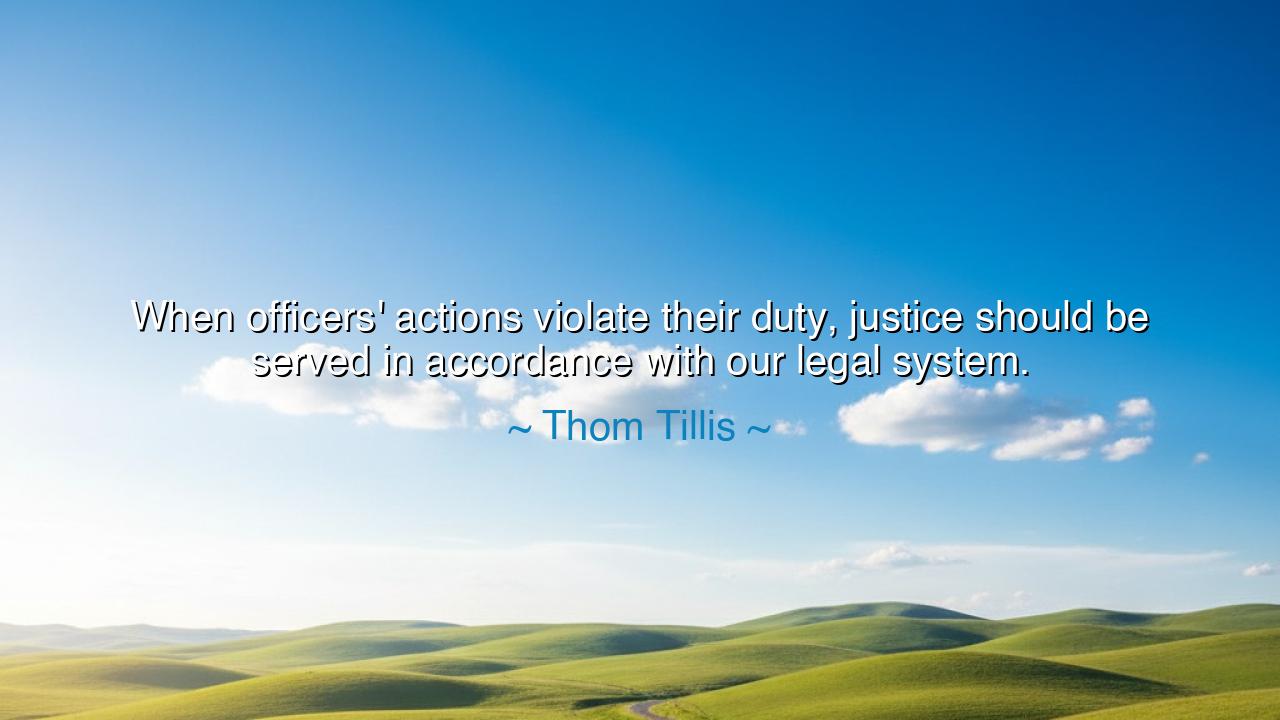
When officers' actions violate their duty, justice should be
When officers' actions violate their duty, justice should be served in accordance with our legal system.






Hear, O seekers of justice and guardians of truth, the words of Thom Tillis: “When officers' actions violate their duty, justice should be served in accordance with our legal system.” These words speak to an ancient struggle—the balance between power and accountability, between the authority of those who guard the people and the responsibility they bear to the very law they uphold. For to wear the mantle of an officer is to bear not only the sword of protection but also the burden of restraint. When that burden is cast aside, the shield of law becomes a weapon of oppression, and only justice can restore balance.
The ancients knew well that even those entrusted with power could fall into corruption. Plato warned in his Republic that the guardians of the city must themselves be watched, for power unrestrained breeds tyranny. To violate duty is not a small thing—it is to betray the trust of the people, to wound the very covenant upon which society is built. For what is the law, if those sworn to enforce it trample it beneath their feet? Thus Tillis reminds us: it is not enough to have a legal system; it must be applied with courage and impartiality, even to those in uniform.
Consider the story of the Roman Centurion Lucius Quinctius Cincinnatus. Though he held command and was honored as a defender of Rome, he laid down his power after fulfilling his duty, returning to his plow as a simple farmer. His greatness lay not in the might of his command, but in his humility and obedience to the republic’s laws. Contrast him with emperors who placed themselves above the law, bringing ruin upon Rome through their arrogance. This is the lesson of history: those who serve must remain servants of justice, or else justice itself perishes.
In our own times, the world has seen moments where the actions of officers have betrayed their duty, sparking outrage and sorrow. Communities cry out not because they hate law, but because they love it too deeply to see it mocked. When those entrusted with protection bring harm, the people’s faith in the system shatters. Yet if the legal system acts with integrity—if it investigates, holds accountable, and restores what was broken—then trust may slowly be renewed. This is why the call to justice is not vengeance but restoration: the healing of the bond between the people and their protectors.
The meaning of Tillis’s words lies in this: that justice must be impartial. It cannot bend to shield the powerful while punishing the weak. The same law that governs the citizen must govern the officer. The same scales that weigh the crimes of the poor must weigh the misdeeds of the mighty. If justice is uneven, it ceases to be justice at all. A law unequally applied is nothing more than tyranny clothed in falsehood.
The lesson for future generations is this: respect those who guard the community, but do not forget that they too are bound by law. Honor their sacrifices, but hold them accountable when they transgress. For a society that excuses betrayal of duty in the name of authority plants the seeds of its own destruction. But a society that demands accountability strengthens its foundations and ensures that the law remains a fortress for all, not a weapon for the few.
Practical action lies before all: support transparency in policing, demand fair investigations when duty is broken, and resist the temptation to excuse wrongdoing because of a uniform. Teach your children that true authority is not domination, but service. And when you see injustice, raise your voice, for silence is the ally of corruption.
So let it be remembered: when officers violate their duty, the cry is not to abolish the law, but to honor it. Justice, served faithfully and impartially, restores order, strengthens trust, and preserves freedom. Without it, authority decays into tyranny; with it, society flourishes. This is the wisdom of the ages: power must always bow before justice, and justice must always stand as the guardian of the people.






AAdministratorAdministrator
Welcome, honored guests. Please leave a comment, we will respond soon